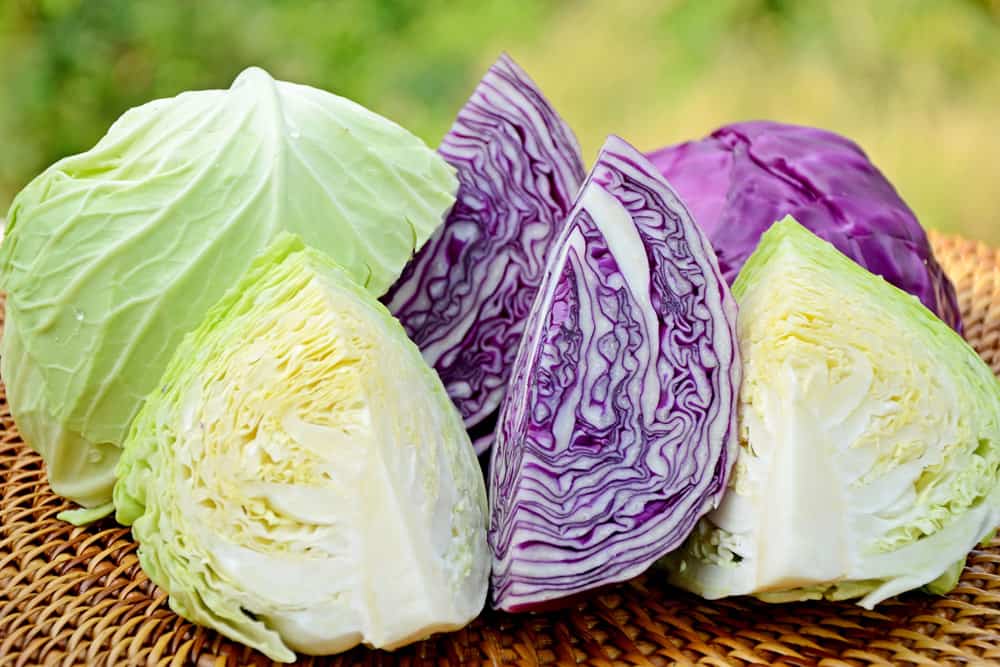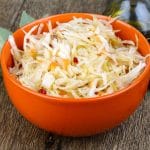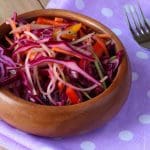Cabbage Facts:

Nutrition Facts
Serving Size 1 Cup - Chopped
Servings Per Container 1
Amount Per Serving
Calories 22
Calories from Fat 0
% Daily Value*
Total Fat 0g
0%
Saturated Fat 0g
0%
Trans Fat 0g
Cholesterol 0mg
0%
Sodium 16mg
1%
Total Carbohydrate 5g
2%
Dietary Fiber 2g
8%
Sugars 3g
Protein 1g
Vitamin A
2%
Vitamin C
54%
Calcium
4%
Iron
2%
Vitamin E
1%
Vitamin K
85%
Thiamin
4%
Riboflavin
2%
Niacin
1%
Vitamin B6
6%
Folate
10%
Pantothenic Acid
2%
Magnesium
3%
Phosphorus
2%
Potassium
4%
Zinc
1%
Copper
1%
Manganese
7%
*Percent Daily Values are based on a 2,000 calorie diet. Your daily values may be higher or lower depending on your calorie needs.
PQ (Protein Quality) x PDCAAS (Protein Digestibility Corrected Amino Acid Score) - 42
Additional Contents
- thiols
- lutein
- lupeol
- indoles
- catechin
- lycopene
- flavonoids
- zeaxanthin
- isoflavones
- phytosterols
- anthocyanins
- bioflavonoids
- beta-carotene
- glucosinolates
- alpha-carotene
- indole-3-carbinol
- complex carbohydrate
Potential Health Benefits
- increased protection from carcinogens
- powerful anti-cancer properties
- increased disease protection
- immune system health boost
- skeletal system health boost
- blood sugar management
- natural body detoxifier
- improved digestion
- headache remedy
- energy boost
Potential Athletic Benefits
- Increase blood sugar regulation for more sustained exercise energy.
- Good source of complex carbohydrates to provide for long term energy demands.
- Decrease post-workout inflammation for improved recovery.
- High level of phytochemical content to help protect against free radical formations within the body from elevated breathing rates.
Glycemic Index Rank
<10 out of 100
| Rank | Value |
|---|---|
| Low Glycemic | less than 55 |
Food Sensitivity Rank
1.2 to 1 ratio
| Rank | Value |
|---|---|
| Low-Medium for Fructose Sensitivity | more than 1 (fructose to glucose ratio) |
Cabbage is an excellent vegetable for improving overall health and human performance due to its incredible cancer fighting antioxidant and phytochemical content contained in each serving. Cabbage is also well-known for its anti-inflammatory properties and its ability to help protect cells against the negative effects of a polluted environment.
- Vascular Effects of Flavonoids
- Dietary Isothiocyanates and Bladder Cancer Risk
- Intake of Cruciferous Vegetables Modifies Bladder Cancer Survival
- Bioactive Substances with Preventive Effects In Cardiovascular Diseases
- Cruciferous Vegetable Intake is Inversely Associated with Lung Cancer Risk Among Smokers

775kcal/serving

bioflavonoids
a natural organic metabolite that is classified into more than 4-6 thousand different forms, each carrying a different benefit to our health. Bioflavonoids can be found inside various types of fruits and vegetables commonly grown in the U.S. and around the world.
Sources include: USDA
***All-Body Fitness takes no responsibility for the accuracy of the information provided above. Please contact a medical doctor or a registered dietitian for nutrition advice.



